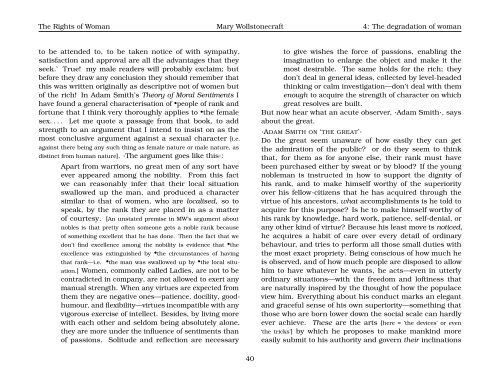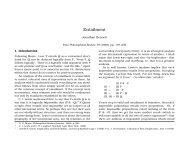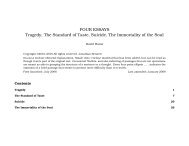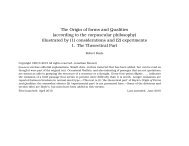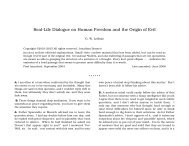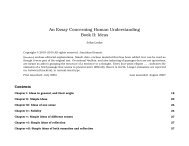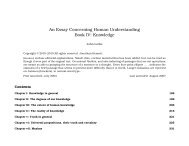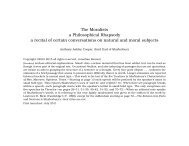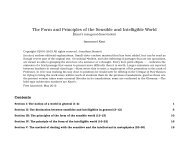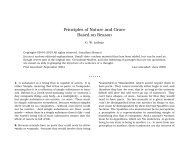A Vindication of the Rights of Woman with - Early Modern Texts
A Vindication of the Rights of Woman with - Early Modern Texts
A Vindication of the Rights of Woman with - Early Modern Texts
Create successful ePaper yourself
Turn your PDF publications into a flip-book with our unique Google optimized e-Paper software.
The <strong>Rights</strong> <strong>of</strong> <strong>Woman</strong> Mary Wollstonecraft 4: The degradation <strong>of</strong> woman<br />
to be attended to, to be taken notice <strong>of</strong> <strong>with</strong> sympathy,<br />
satisfaction and approval are all <strong>the</strong> advantages that <strong>the</strong>y<br />
seek.’ True! my male readers will probably exclaim; but<br />
before <strong>the</strong>y draw any conclusion <strong>the</strong>y should remember that<br />
this was written originally as descriptive not <strong>of</strong> women but<br />
<strong>of</strong> <strong>the</strong> rich! In Adam Smith’s Theory <strong>of</strong> Moral Sentiments I<br />
have found a general characterisation <strong>of</strong> •people <strong>of</strong> rank and<br />
fortune that I think very thoroughly applies to •<strong>the</strong> female<br />
sex. . . . Let me quote a passage from that book, to add<br />
strength to an argument that I intend to insist on as <strong>the</strong><br />
most conclusive argument against a sexual character [i.e.<br />
against <strong>the</strong>re being any such thing as female nature or male nature, as<br />
distinct from human nature]. ·The argument goes like this·:<br />
Apart from warriors, no great men <strong>of</strong> any sort have<br />
ever appeared among <strong>the</strong> nobility. From this fact<br />
we can reasonably infer that <strong>the</strong>ir local situation<br />
swallowed up <strong>the</strong> man, and produced a character<br />
similar to that <strong>of</strong> women, who are localised, so to<br />
speak, by <strong>the</strong> rank <strong>the</strong>y are placed in as a matter<br />
<strong>of</strong> courtesy. [An unstated premise in MW’s argument about<br />
nobles is that pretty <strong>of</strong>ten someone gets a noble rank because<br />
<strong>of</strong> something excellent that he has done. Then <strong>the</strong> fact that we<br />
don’t find excellence among <strong>the</strong> nobility is evidence that •<strong>the</strong><br />
excellence was extinguished by •<strong>the</strong> circumstances <strong>of</strong> having<br />
that rank—i.e. •<strong>the</strong> man was swallowed up by •<strong>the</strong> local situation.]<br />
Women, commonly called Ladies, are not to be<br />
contradicted in company, are not allowed to exert any<br />
manual strength. When any virtues are expected from<br />
<strong>the</strong>m <strong>the</strong>y are negative ones—patience, docility, goodhumour,<br />
and flexibility—virtues incompatible <strong>with</strong> any<br />
vigorous exercise <strong>of</strong> intellect. Besides, by living more<br />
<strong>with</strong> each o<strong>the</strong>r and seldom being absolutely alone,<br />
<strong>the</strong>y are more under <strong>the</strong> influence <strong>of</strong> sentiments than<br />
<strong>of</strong> passions. Solitude and reflection are necessary<br />
40<br />
to give wishes <strong>the</strong> force <strong>of</strong> passions, enabling <strong>the</strong><br />
imagination to enlarge <strong>the</strong> object and make it <strong>the</strong><br />
most desirable. The same holds for <strong>the</strong> rich; <strong>the</strong>y<br />
don’t deal in general ideas, collected by level-headed<br />
thinking or calm investigation—don’t deal <strong>with</strong> <strong>the</strong>m<br />
enough to acquire <strong>the</strong> strength <strong>of</strong> character on which<br />
great resolves are built.<br />
But now hear what an acute observer, ·Adam Smith·, says<br />
about <strong>the</strong> great.<br />
·ADAM SMITH ON ‘THE GREAT’·<br />
Do <strong>the</strong> great seem unaware <strong>of</strong> how easily <strong>the</strong>y can get<br />
<strong>the</strong> admiration <strong>of</strong> <strong>the</strong> public? or do <strong>the</strong>y seem to think<br />
that, for <strong>the</strong>m as for anyone else, <strong>the</strong>ir rank must have<br />
been purchased ei<strong>the</strong>r by sweat or by blood? If <strong>the</strong> young<br />
nobleman is instructed in how to support <strong>the</strong> dignity <strong>of</strong><br />
his rank, and to make himself worthy <strong>of</strong> <strong>the</strong> superiority<br />
over his fellow-citizens that he has acquired through <strong>the</strong><br />
virtue <strong>of</strong> his ancestors, what accomplishments is he told to<br />
acquire for this purpose? Is he to make himself worthy <strong>of</strong><br />
his rank by knowledge, hard work, patience, self-denial, or<br />
any o<strong>the</strong>r kind <strong>of</strong> virtue? Because his least move is noticed,<br />
he acquires a habit <strong>of</strong> care over every detail <strong>of</strong> ordinary<br />
behaviour, and tries to perform all those small duties <strong>with</strong><br />
<strong>the</strong> most exact propriety. Being conscious <strong>of</strong> how much he<br />
is observed, and <strong>of</strong> how much people are disposed to allow<br />
him to have whatever he wants, he acts—even in utterly<br />
ordinary situations—<strong>with</strong> <strong>the</strong> freedom and l<strong>of</strong>tiness that<br />
are naturally inspired by <strong>the</strong> thought <strong>of</strong> how <strong>the</strong> populace<br />
view him. Everything about his conduct marks an elegant<br />
and graceful sense <strong>of</strong> his own superiority—something that<br />
those who are born lower down <strong>the</strong> social scale can hardly<br />
ever achieve. These are <strong>the</strong> arts [here = ‘<strong>the</strong> devices’ or even<br />
‘<strong>the</strong> tricks’] by which he proposes to make mankind more<br />
easily submit to his authority and govern <strong>the</strong>ir inclinations


